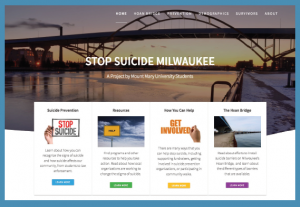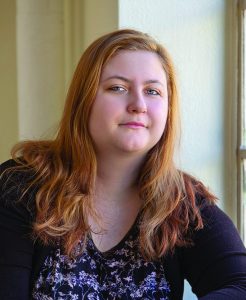Student Essay: How I Learned To Write For Others

Posted on November 16, 2018
By Julia Wachuta
I was shaking as I held my phone in my hand. I had to call this number to reach the deputy fire chief. There was no email listed, and I was short on sources.
It had to be done. But would they take a student reporter like me seriously?
This story was going to be important. I picked up my phone, inhaled and exhaled slowly, then hit the green button.
This past spring semester, I had the privilege to be a part of Laura Otto’s longform journalism class. The class created a semester-long project on the subject of suicide prevention, which resulted in a multimedia website.
Longform journalism is a style of reporting that enables a reporter to cover one topic or story extensively over a longer period. Doing so allows more specific details to be reported, along with more angles.
When it came time to choose our subject, the class voted for the topic of suicide prevention. When it was assigned, I wasn’t happy about it. I had been hoping for something a little more original. Little did I know how much I would come to appreciate the many facets of this project.
At first, we struggled. In trying to find sources, some people had not gotten replies and others had been denied interviews. I was struggling to break out of my comfort zone and contact a man that I knew would be an excellent source. This required a phone call to contact a Milwaukee deputy fire chief who had prevented someone from jumping off the Hoan Bridge.
Eventually I swallowed my fear and dialed the phone. In no time, I had an interview scheduled with a knowledgeable source. Around this time, other students were busy emailing a variety of sources: survivors, medical professionals, mental health professionals, professors and organization members.
We had no idea that one email would change the whole course of our project.
When we contacted Prevent Suicide Greater Milwaukee, its chairperson, Barbara Moser, was more than happy to help. She volunteered to speak to our class, invited us to a quarterly meeting, introduced us to more sources and invited us to a showing of the movie Suicide: The Ripple Effect. At this point we were no longer just student reporters. We had become part of a community that was fighting for the same goal.
In the end, our project certainly received a lot of attention, as it was released around the time of the high-profile suicides of Anthony Bourdain and Kate Spade.
When this project began, I thought it was going to be just another assignment. In reality, there was purpose in our efforts, as our stories met a public need. The fight against suicide is far from over.
“At this point we were no longer just student reporters. We had become part of a community that was fighting for the same goal.”
This is why journalism is important. Reporters tell the stories that would otherwise remain silent. They recognize that all it takes is one good story to open someone’s eyes or spark the need for change in a community.
I’m so grateful that I took the risk and enrolled in the class. I walked through the door in January thinking that I was taking this class just for me. After everything, I feel like a more complete person, not only because of the writing, but because of the people that I came to know, learn about and relate to.
Through this class, I realized that I was not writing for myself anymore, but for every pair of eyes that read my articles.

What happened next?
- Prevent Suicide Greater Milwaukee asked us to present our finished project at it’s June quarterly meeting. The members were excited to see what our class had done with their contribution.
- We spread the website around on our social media pages after the recent celebrity suicides.The project quickly got well over 400 views, and the number is still growing.
- One of our students, Branwyn, was interviewed on WTMJ radio about the project. People are noticing our work. Listen to the interview below.

Julia Wachuta is a junior majoring in English with a specialty in Writing for New Media. She is minoring in business and Spanish. She is also the managing editor of Arches.



